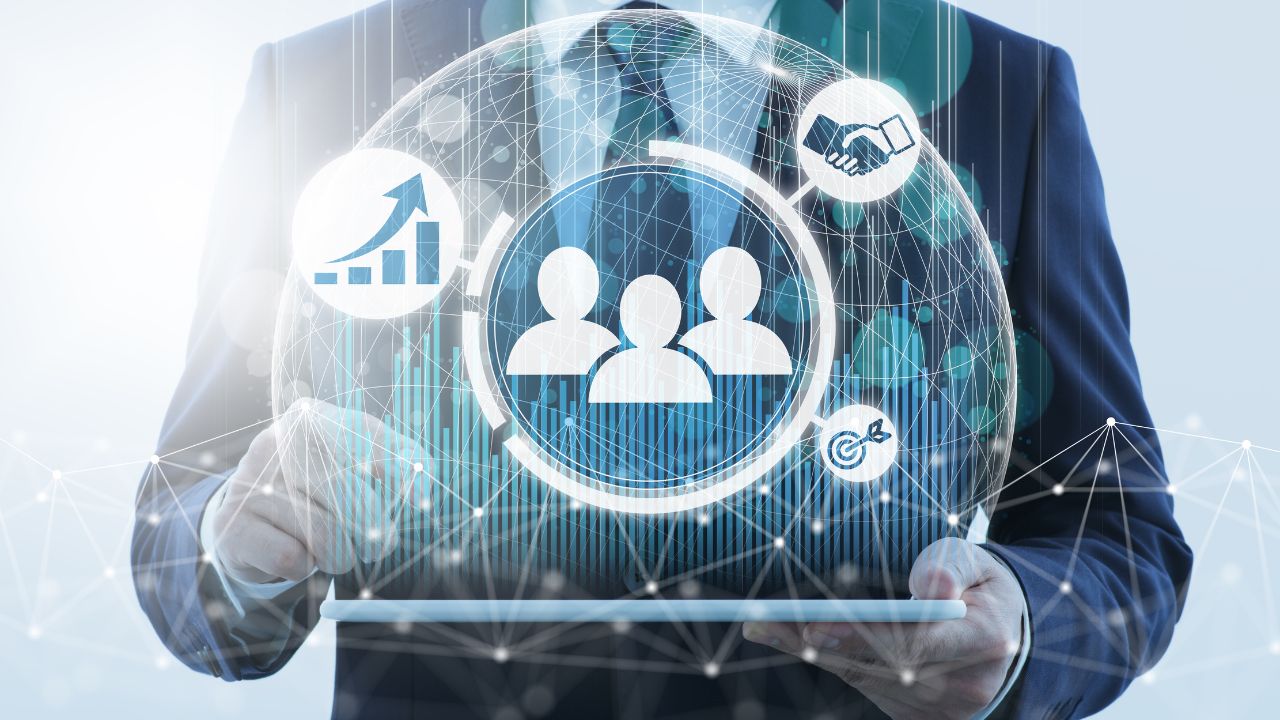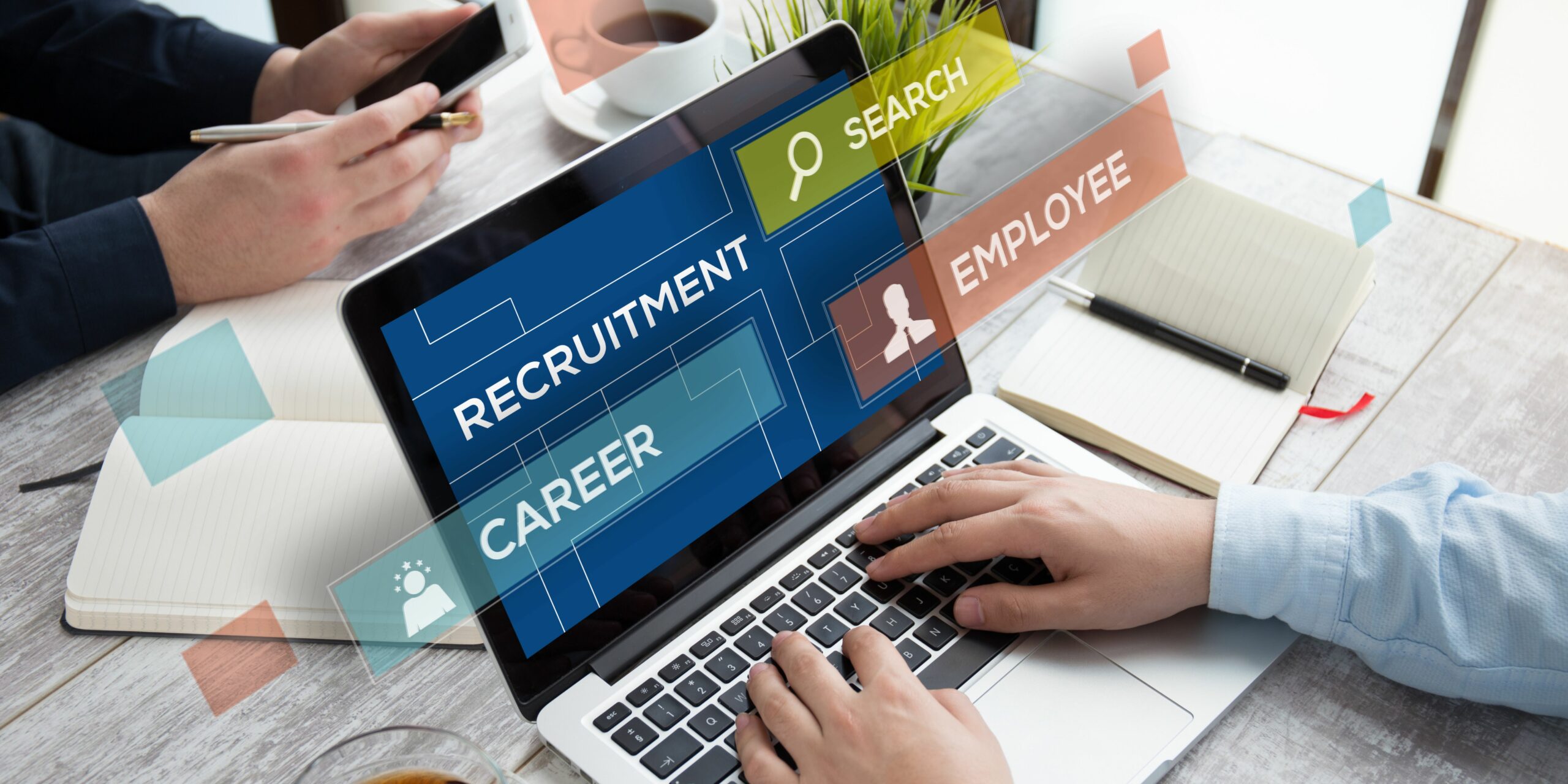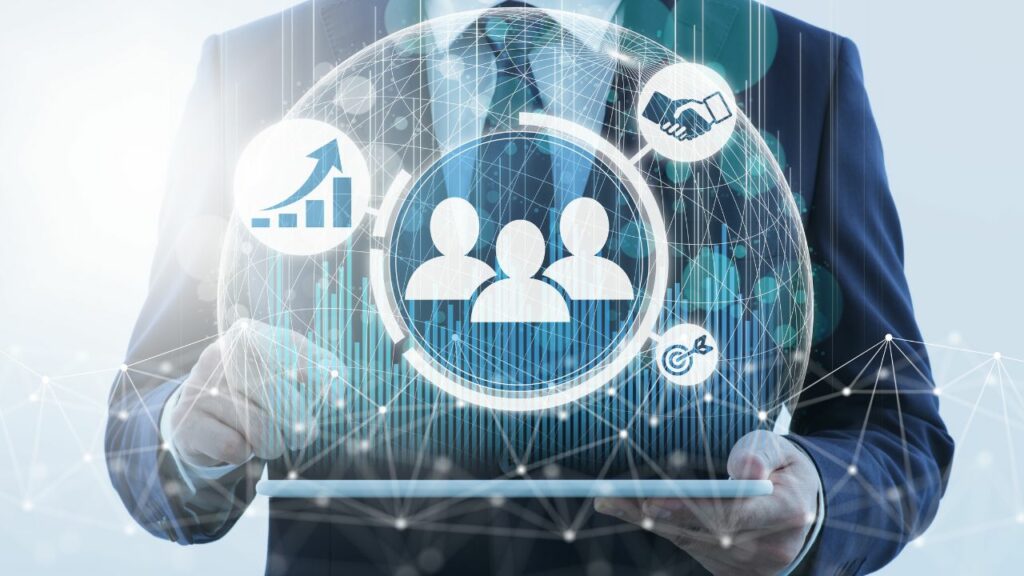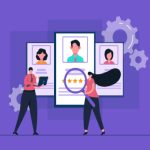 With AI-based talent intelligence solutions, organizations use a more integrated approach to managing employee careers. Using AI in talent management, businesses support this integration by mapping careers, enhancing learning initiatives, consumerizing the HR experience for staff members, hiring more proactively, and managing personnel development cycles.
With AI-based talent intelligence solutions, organizations use a more integrated approach to managing employee careers. Using AI in talent management, businesses support this integration by mapping careers, enhancing learning initiatives, consumerizing the HR experience for staff members, hiring more proactively, and managing personnel development cycles.
What is AI in Talent Management?
Organizations can use AI to determine the talent they have and the skill they lack, significantly improving the effectiveness and efficiency of hiring. Companies no longer waste time and money hiring for positions they don’t need. Instead, they may identify precisely which skills are lacking, leading to developing a more flexible and strategic personnel planning approach.
AI is particularly beneficial as talent acquisition shifts to a skills-based methodology. Companies may be more forward-thinking by focusing on skills and identifying individuals with specific experiences and parallel skills, which are talents that may not be precisely the same but have similar characteristics. DEI initiatives can now be made possible in a way that was previously more of an intent than an action item in corporate HR, thanks to AI technology that uses skills as the core component of talent evaluation.
How AI is being used in talent management
The application of AI can be advantageous at every phase of the human resource management process, from preliminary applicant screening and short-term talent selection to following procedures for onboarding new personnel and evaluating performance. Artificial intelligence tools assist in rationalizing personnel tasks, restructuring repetitive administrative tasks, and gaining exceptional insights into each applicant and employee.
Three ways you can use AI in talent management

There are three approaches to employing AI to enhance the effectiveness of recruiters and the talent management process:
Speed of hiring
After any recruitment process, every hiring manager wants to locate the best candidate for the open position and hire them as soon as feasible. With AI technology, you can use pre-hire tests to screen candidates before reviewing their resumes. Hence, in addition to analyzing a ton of data, your AI tool is also assisting you in expediting the hiring process.
Improved candidate experience
Organizations must provide a pleasant candidate experience in today’s candidate-heavy market to keep candidates engaged throughout the hiring process. With the use of artificial intelligence (AI) technology, you may program automated messages to inform applicants of the status of their applications and offer them access to job simulations that would give them a first-hand impression of the position and the workplace.
Elevate recruiters to strategic advisors
The hire’s quality must be the hiring process’s primary focus. To enable your hiring managers and recruiters to concentrate on the candidates themselves, remove the administrative and monotonous activities from the process. As AI does these activities, you free up your recruiters to take on more strategic roles and choose the best applicant for your business by taking a higher-level view of the situation.
Risks of using AI in the talent acquisition process
While using AI for talent acquisition, some hazards can occur, just like with any new technology.
The two most significant threats for organizations to pay notice of are:
Security
Security lapses and data leaks are issues that HR professionals must be aware of. Employers also need to ensure that candidates’ data privacy is maintained and that the information they provide them during the hiring process is handled carefully.
Ethics
While employing AI technology, organizations need to be mindful of their ethical obligations. Not all AI technologies are created equal; some could harm a company’s reputation if utilized improperly. If you need to understand how your AI technology works, it may make decisions consistent with your business’s morals and values.
The challenges of applying AI in recruiting

Artificial intelligence is not impervious to challenges; certain drawbacks are ignorable, but they essentially always occur. AI has limitations, some of which are preventable and others of which are not:
1. AI requires a lot of data
To successfully simulate human intelligence, AI often needs a lot of data. For instance, to evaluate resumes as precisely as a human recruiter, machine learning-based AI requires much data to understand. This could entail hundreds to thousands of resumes for a particular position.
2. AI can learn human biases
By ignoring details like a candidate’s age, gender, and ethnicity, artificial intelligence in hiring is expected to lessen unconscious bias. AI knows how to look for patterns in past behavior, though. Hence, any bias that may already exist in your hiring procedure on the part of humans, even if it is unconscious, could be picked up by AI if it is developed carelessly.
Also, ensure the provider of AI software you employ has taken measures to ensure that their AI is built and continuously looked for any patterns of potential bias to prevent reproducing any biases that may already be present.
3. Skepticism of new technology
HR professionals frequently receive the most recent and essential trend, but it quickly fades away. Leaders in recruiting and talent acquisition might be wary of any technology that claims to simplify their tasks or improve the HR ecosystem. They want to be sure that any software they choose to automate one of their tasks will be able to perform the digital transformation job as well as they can.
Implementation of artificial intelligence in an enterprise
The most challenging aspects of integrating artificial intelligence include altering the leadership and culture of the company, obtaining new information, and changing business procedures.
Acquiring and retaining talented employees
Employers may pick candidates more quickly and find talent by using artistic intelligence to assist them in getting a comprehensive set of necessary knowledge and abilities. Technology helps HR professionals choose qualified job candidates, enables them to spend more time on duties with a higher added value, and allows them to concentrate on more crucial business and strategic tasks. AI assists in analyzing candidate profiles, determining whether each prospect possesses the necessary skills for the job offer. Sending applicants automated emails also facilitates contact.
Talented workers can integrate and organize company operations, handle issues quickly and effectively, enjoy taking on new challenges, and are driven, self-reliant, self-assured, empathetic, and keen to improve business change.
Appropriate training of employees
Artificial intelligence can also speed up the process of learning and development. For instance, a business may create a unique learning program for its staff using artificial intelligence. The ability to customize this program to a person’s needs and tastes will enable them to pick up new skills more quickly and successfully. Artificial intelligence thus raises employee engagement levels and facilitates quicker learning. Businesses can also utilize artificial intelligence to monitor employee progress and offer pertinent feedback. Employees will experience more significant support, motivation, and engagement as their careers advance.
Forming appropriate teams
Businesses can compete more successfully by adopting new ideas, perspectives, and employee work practices. Each team can create innovative methods to boost productivity and enable them to complete jobs more effectively, raising worker engagement. Artificial intelligence has allowed workers to collaborate swiftly and efficiently with teams. The technology’s ability to recognize and group relevant issues make it simpler for team members to work on specific project-related duties. Also, it improves communication among staff members and lessens misunderstandings.
By automatically classifying and arranging incoming emails, messages, and documents, artificial intelligence can aid employees in communicating more effectively. Also, it can offer summaries of discussions or particular themes to assist staff in staying current on all recent developments. If they want to guide a business toward success, executives must encourage and develop the teamwork skills of their team.
New organizational culture
Building an enterprise driven by artificial intelligence requires a solid organizational culture. Businesses that create a welcoming workplace and an excellent artificial intelligence culture can successfully manage change and recruit all of their personnel. The leader must establish a culture enabling the company to grow and quickly adjust to changing business realities. Using better representational concepts and goods will aid the development of a more inclusive future.
Moreover, chatbots with artificial intelligence assist businesses in retaining a welcoming and positive workplace culture for all employees. Fostering an open atmosphere for all staff members, not just those closest to senior management, promotes interpersonal harmony. It’s critical to establish a new organizational culture that supports experimentation, ongoing innovation, and the creation of fresh approaches. In turn, the firm performs better as a result. Establishing a culture that promotes innovation in artificial intelligence impacts competitiveness.
New ways of leadership
Leaders must genuinely understand the business value of investing in artificial intelligence and be willing to push for significant change. The leadership position will maximize the application of artificial intelligence within the organization. Artificial intelligence and other new technologies have altered the nature of leadership. With big data analytics based on AI and ML approaches, new business application insights are made available. Due to the deployment of artificial intelligence, leaders will concentrate more on the emotional factor and less on the cognitive processing of facts and information.
Reducing the workload of employees with artificial intelligence
Artificial intelligence will increasingly perform routine operational tasks, freeing workers to concentrate on creative and strategic projects that develop the human resources industry. By enhancing remote staff monitoring, artificial intelligence affects employee engagement. Employees may now interact more quickly and successfully with distant coworkers thanks to solutions powered by artificial intelligence. This fosters better collaboration and communication among teams, regardless of where they are. Employees can use artificial intelligence to help them create goals, receive timely feedback on their development, and locate training programs pertinent to enhancing particular skills.
Thanks to artificial intelligence, employees can save up to a third of the time they would otherwise spend on simple, boring jobs. Employee engagement and work performance both rise as a result of this. Artificial intelligence can assist workers with monotonous and time-consuming jobs, thereby reducing their workload and boosting output.
Also read: Enhancing Customer Experience with AI: A Complete Guide
FAQs
How can recruiters use AI?
By identifying more qualified candidates and sourcing additional candidates, AI recruiting technologies help firms enhance their hiring operations. By making it more straightforward for job searchers to apply for open openings and contact the employer directly, the platforms can also improve the candidate experience. Employees can have greater privacy and fewer bias thanks to an AI-powered background check. Also, it simplifies background checks, allowing the business to validate candidate information more rapidly and effectively in a scaleable way.
How AI is used as a recruitment tool?
AI for recruiting technology enables recruiters to evaluate resumes fairly, shortlist candidates more precisely, and employ more quickly. The recruiting life cycle now includes all stages, including sourcing, candidate screening, interviews, candidate assessment, and many more areas. AI tools can quickly and accurately make decisions that people often make. Furthermore, AI can lessen prejudice, enhance the applicant experience, and increase the effectiveness of manual jobs.
How does AI impact human resource management?
The labor-intensive market has evolved with the arrival of more advanced technology, like AI. Undoubtedly, this technology has dominated several market sectors, and HRM is no exception.
Including artificial intelligence (AI) in HR procedures are not novel. A specific set of advantages make organizations better. These tools allow HRM to support itself in analyzing, forecasting, and diagnosing work. In today’s cutthroat environment, hiring and retaining the best employees involves a lot of work on the side of HR departments. In recruiting, training, and operations, HR must offer exceptional employee and applicant experiences quickly, accurately, and individually.
What are some examples of artificial intelligence that are used in HR?
Artificial intelligence in the human resources division of a business can streamline tasks, boost output, and improve performance. Information extracts from unstructured documents like resumes, letters of recommendation, and experience letters using AI. It also creates a thorough candidate profile and harvests social media profiles. Additionally, it also uses clustering to help locate resumes comparable to one of the shortlisted candidates and matches the job description, and predictive algorithms to forecast attrition.





